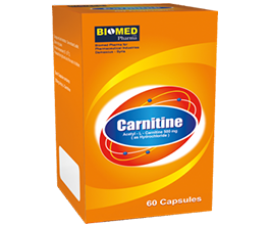Carnitine
- Acetyl-L-carnitine
Each Capsule contains 500 mg acetyl-L-carnitine
Leaflet
Carnitine
Composition:
Each Capsule contains 500 mg acetyl-L-carnitine (as acetyl-L-carnitine hydrochloride).
Properties:
Acetyl-L-carnitine is an ester of the amino acid L-carnitine, which can be synthesized by the body from lysine and methionine. Acetyl-L-carnitine acts as a parasympathomimetic due to its structural mutualities with acetylcholine. In this sense, acetyl-L-carnitine acts as a cholinergic neurotransmitter and as such seems to stimulate the neuronal metabolism in the mitochondria. In addition, acetyl-L-carnitine also acts as a substrate reservoir for the cellular energy production. This could be decisive for the fact that sufficient intracellular levels of acetyl-L-carnitine can prevent the excessive dying of nerve cells. It could also be proven that acetyl-L-carnitine seems to enhance the effectiveness of certain nerval growth factors in individual brain areas.
Usage:
Alzheimer dementia: Acetyl-L-carnitine has a positive effect on the cognitive performance in patients suffering from an Alzheimer-type dementia. The intake of the substance for a longer period of time seems to improve the long-term memory.
Depression: In patients with major depression, acetyl-L-carnitine supplementation can lead to a changed circadian rhythm of the glucocorticoid secretion and an increase of the overall cortisol level. The additional administration of acetyl-L-carnitine can therefore support the treatment of depression symptoms.
Cerebral circulatory disturbances: There are positive results with regard to the use of acetyl-L-carnitine in cases of cerebral ischemia as well as reperfusion. Studies have shown that the administration of acetyl-L-carnitine could reduce the neuro-logic secondary injuries experienced after such events.
Cardiovascular disturbances: Acetyl-L-carnitine increases the transport of fatty acids for ATP production into the mitochondria of skeletal muscles and the myocardium and thus has a protective effect against damage caused by free radicals.
Diabetic secondary injuries: In diabetics, acetyl-Lcarnitine alleviated neuropathic pain and improved the peripheral nerve function. The substance therefore seems to have positive effects on the metabolic as well as the functional disturbances in diabetic polyneuropathy.
Alcohol abuse: acetyl-L-carnitine have effects on the hepatic alcohol degradation by delaying alcohol oxidation. Therefore, acetyl-L carnitine could be of potential use in the therapy of cognitive disturbances in alcoholic disease.
Side Effects and Contraindications:
- The supplementing intake of acetyl-L-carnitine is effective and safe if it is within the recommended dosage range. Also in case of long-term application of over one year no essential side effects could be observed.
- The most frequently described undesired reactions were increased drive, nausea as well as vomiting.
- Pregnant and lactating women should consult their doctor before intake.
- Acetyl-L-carnitine is not suited for dialysis patients.
Dosage:
Take 1– 2 capsules 3 times a day at mealtimes with plenty of fluid.
Presentation:
Carnitine 500 mg: Box contains 30 Capsules.
Carnitine 500 mg: Box contains 60 Capsules.
Storage:
Keep tightly closed in a dry place; do not expose to excessive heat.

